- Home
- J. -H. Rosny aîné
The World of the Variants Page 6
The World of the Variants Read online
Page 6
The child laughed again, and this time I understood exactly why he was laughing, as well as his consolations and his hopefulness.
Sabine was alive! The penetrating certainty filtered into my soul, more gently than the rays of dawn through the branches of some dark African forest. She was alive—but where? Could I obtain any indication of that from the clever child?
Not only was I able to do so, but with details that surprised me. We had found a language and, every success calling forth further ones, the language soon expressed quite delicate sensations, and even a few abstract ideas.
Thus, I learned that Sabine had initially been taken to the island near the reed-bed. The child told me—although I would certainly have guessed—that there was a cave there, into which Sabine had been taken down.
My supposed hallucination had, therefore, been true; the plaints emerging from the dark and silent hole really had come from my unfortunate fiancée. From that cave she must have been transported to the homeland of the Dark Water-People—which, the child indicated to me, lay to the west.
IV. The Channel
Determined to catch up with Sabine, I racked my brains to find a means. With my knife, I fashioned one of the small tree-trunks of our platform into a scull, and, having been familiar since infancy with that kind of oar, I contrived to travel at 14 or 15 meters a minute. At that rate, to be sure, it would take many hours to reach the invisible shore, but action cost me less than inaction; I was happy to exert myself for my beloved, and I already felt rewarded for the effort, in the advent of hope.
Throughout the rest of the day, my scull turned in the water.
The Sun was declining when I perceived the first hills and treetops of the shore. Undecided as to where to moor, I woke the child. He showed me a point marked by the fleece of a great forest, about a kilometer to the right. We soon found the entrance to a broad channel, and, on the child’s orders, I took the raft into it. The waters were so sluggish that they seemed to be emerging from a lake rather than descending from a mountain. To the right and the left, on the banks, trees sprang out of the stream like colossal pillars, forming gigantic colonnades. A chilly impression fell from branches opening out like vast hands.
The setting Sun hung over the depths of the channel, the waves bearing a few bloody stains on their crests. Under the water, tree-trunks were visible within 15 feet. Large blind fish were drifting there, along with enormous crustaceans green-tinted by algae, and abundant cephalopods of an unknown species, with immense eyes. Everything advertised a life in shadow, pale and feverish, the blanched fecundity of plants and animals that had renounced the light. Admirable algae carpeted the shallows, trailing their disorderly hair, several meters long, in the direction of the current; lichens, coarsely sculpted, extended in bizarre strata; and insects like tortoises with enormous oval carapaces were grazing everywhere. A spider as big as a fist, suspended from the branches by a thread, dived to seize soft prey; huge white flies were hovering over livid mushrooms. My scull disturbed a duck-billed mammal, and there were flocks of bats in the air.
The further we went, the darker it became. The channel’s banks became steeper, its trees bending over, and I was subject to a grandiose horror, impassioned by these terrible things that had nothing in common with my desire to see Sabine again. The child had gone back to sleep. The last bloody draperies folded themselves away into the waves. Absolute darkness veiled my route. I took up a position at the front of the raft and paddled through the darkness for a good part of the night.
V. The Luminous Forest
I suppose that it was about midnight when the child woke up. His shoulder was much better. We were hungry, but he succeeded in discovering some edible nuts. After the meal I fell into a light sleep.
When I woke up again, the Moon must have been somewhere over to the left, for a spectral light was coming through the trees from that direction; there were vague images of muslin, a nebulous floating whiteness, like a light frost in the forest.
A cavernous darkness reigned in the gaps in the colonnade, illuminated only by the phosphorescent backs of a few fish. I started paddling again.
Taking every precaution, I advanced with an extraordinary slowness, with the result that in three hours I had not covered two kilometers. A sort of dark cliff then loomed up in front of me, while a strange brightness came from the left. Was that really the Sun already? Was the dawn light now filtering through the forest?
I steered the raft toward the light. Ten minutes sufficed to turn the corner, and a vast landscape appeared, brighter than a moonlit snow-field. Neither the Moon nor the Sun was illuminating it, though.
An errant luminosity, with broad moiré patterns, lay upon the river, which now broadened out to the proportions of a lake. The waters, which were lost in the far distance in a flooded forest, were shallow, for initial bifurcations of tree-roots were visible. The light was coming from these roots, in dense circles which became fainter as they extended—but it was shadowless, like a colossal sheet of flat flame, and everywhere the light was moving: undulating, fading, reviving, rippling. It ran from bushes in rutilant miniature cascades, scattering in the breeze like wasps of light, and oscillating broadly in the rare places where the water was able to reflect it. A vast, stupefying silence reigned over everything.
I remained motionless on the threshold of that enchantment. My most distant childhood took control of all my actions. At that age, I was capable of naïve admiration and mysterious terror, curiosity regarding the invisible, and a prickling sense of the occult. I thought that I was confronted by some legendary city beneath the lake, which the Water-People had found a means of illuminating. I imagined that new humankind, inaccessible to my weakness. I, the representative of superior races, had the fearful, melancholy and resigned impression of vanquished races. Innumerable things crumbled within me, including the certainty of belonging to the most advanced human race. I understood the slide into the abyss experienced by our poor rivals, life taking refuge in dreams, confused theories and the consolations of Nirvana.
The phenomenon was, however, complicated by the presence of a being. In the distance, on an islet, there was a man, whose silhouette moved against the background of light. That giant silhouette reached all the way to the first branches of an ash-tree, three meters from the ground. He was very thin, and I soon saw that his height was entirely due to his legs.
Three or four other men of the same kind appeared on the islet; then they went into the water, which came up to their waists. They headed toward us at a rapid pace, and I woke my companion.
Alarmed, and dazzled by the excessively bright light, he shaded his eyes with his hand in order to see better, but nothing in the exclamation he uttered was expressive of surprise or fear. Meanwhile, the men were coming closer. Their torsos were exposed to a greater or lesser extent, according to the depth; sometimes, even their legs were not fully submerged. I had time to realize that those excessively thin legs were matched by exceedingly long arms, stiff and as slender as lianas, covered with yellowish scales, with no trace of hair. Their torsos, by contrast, were hairy and white; their chests were narrow, their heads small, with large, cold, excessively mobile eyes.
The child seemed to take pleasure in their presence—a pleasure mingled with mockery. He spoke to them from a distance. I listened avidly to their reply. They did not have the batrachian voices, moist tones or splashing lips of my Water-Men; on the contrary, the muffled sounds were clipped before emerging from their throats, the syllables further chopped by the movement of their jaws.
With grave expressions, they surrounded our raft. Their entire being gave the impression of a sad race, confined to sterile lands. In the half-light, they manifested the pallor of subterranean life; their pale hair was the color of ash, the hair on their breasts paler than that on their backs.
I don’t know why their presence made me feel pity; perhaps it was the protective attitude of the child, perhaps an instinct that showed me these narrow-headed people as
pariahs.
I imagined them as having failed in their metamorphosis. Driven back by powerful Mongol nations into these marshlands, inaccessible to the rest of humankind, they had been obliged to live prudently and discreetly. The perpetual effort of finding their nourishment in the marshes and pools had, over the centuries, elongated their limbs. Then new populations of the same provenance had arrived; either a firmer sense of purpose had impelled them as far as the great lakes, or, time having made the region more hospitable, the latecomers had been able to choose a bolder and more successful adaptation, in becoming amphibians, leaving these sad precursors far behind, reduced to the frequentation of shallow sub-forest waters.
I understood that the child was asking them to push the raft, and it seemed more an order than a request. Stupid and gentle, they obeyed in a melancholy fashion—with, I believe, an awareness of their weakness.
Our raft glided through the luminous forest. The scene was dream-like. The ripples of our passage raised radiant wave-crests in the distance like beautiful gleams of mother-of-pearl, but the place where we passed was a rip in a silver cloth, leaving behind a dark wake, while condensations of light traced long furrows to the right and the left. I studied the waters attentively; I plunged my hand in, then drew it out again, flamboyant, and I realized that little vegetable cells, which my subsequent studies permitted me to recognize as animate algal zoospores, probably in their reproductive phase, were moving in a manner similar to that of tadpoles—and were, moreover, phosphorescent.
After hours of travel, the channel began to narrow again, and the water soon came up to the necks of our poor breathless waders. They swam for a few minutes, then, exhausted, abandoned the raft and climbed up on to the bank. As they drew away, my interest in them increased; there was nothing more humble and pitiful than their sad skeletons; whether they were folded up like bizarre marsupials or stood erect, they had the melancholy appearance of being too frail and too long. The last time I saw them, they were trotting along beneath the branches, and their procession of mortal pallor seemed to be moved, like the severed legs of spiders, by a mysterious desolation.
I started paddling again. The water was getting even deeper, the trees sparser, and I was able to see my way through the darkness. I think the child had gone back to sleep. All my sensations then became dreamlike. It seemed to me that a black hole was sucking in the raft, that I was about to sink into some dark abyss, and that I would never again experience the sweet sensation of my lips on my beloved’s hair. My courage weakened, although I recalled the moments, almost as bitter, that I had patiently endured in the course of our long journey. Then, however, there had been Devreuse’s energy, the presence of Sabine and our European companions; above all, the perils had been foreseen, the struggle had been undertaken against cataloged forces. Now, in the solitude, with the possibility of ambush by men infinitely different from and more powerful than us, and the darkness of the interminable forest, there was a dreadful anticipation in my failing heart of some further prodigious adventure, in which it seemed that my reason was sure to be unhinged.
My paddle was now only beating the waves with intermittent and ineffectual strokes; the darkness trembled vertiginously before my eyes. There were periods when I was not exactly sure whether I was still paddling or whether I had stopped, others when I sometimes thought that I was wandering through urban side-streets, and sometimes that I was sitting on top of a lighthouse—then I shook myself in order to rediscover the river, the night, the rafts, murmuring words that had no connection with the time or the place.
Finally, I sensed that I was definitely falling into unconsciousness, and I remember that my last effort was to reproach myself for the probable wreck of the raft, and to perceive the light of dawn, like a white speck in the channel.
VI. In the Storm
When I came to, the raft was moving at a good speed; we had passed through the channel and were in the open water of a lake. It was terribly hot. Immense clouds were alternately covering and uncovering the Sun.
I looked around for the boy. I saw him at the back of the raft, immersed, pushing it with his good arm. He smiled at me, and pointed at a region of cavernous hills to the north.
“Is that where we’re going?” I asked.
His gesture said “yes,” and he pressed his hand to his breast—which, in our language, signified “Sabine.”
“Sabine!” I said.
I invited the child to rest. He refused. Then I took the scull and paddled. Large drops of sweat bathed me. A heavy electricity was coming from the low clouds. Although there was not much wind, the waves were turbulent and choppy. To our right, the somber mass of the forest became darker and darker, and through a gorge, further away than the cavernous hills, in a sort of desert, whirlwinds of sand covered the entire sky.
I felt the anguish that one experiences in crises, and also a strange sense of rivalry—that of man against the elements. The child was pushing forcefully, while I plied the scull steadily; our combined efforts were bringing us closer to the shore.
We were no more than 100 meters away when the storm burst. Its insensate fury immediately covered the lake with frightful waves. A waterspout lifted me up, swallowed me, and returned me to the surface, and the liquid whips of the rain lashed me, blinding me.
The entire landscape had disappeared into the grayness. I huddled convulsively, clinging to the logs of the little raft, whose ropes were giving way; I foresaw the moment when I would be left without support. The child had disappeared; I suppose he was two or three meters underwater, laughing at the storm and keeping watch on me. How could he have done otherwise, since the tail of the waterspout, with one last effort, had pulled my raft apart? Hurled far away from any support, I was seized and dragged toward the shore.
The child became fearful at the first claps of thunder. These rumbles, stifled at first beneath the low and irregular clouds, soon became a frightful din, as the vault of cloud became higher and more homogenous. Lightning-flashes bit into the waters in brief zigzags, which lit up as soft and large as electric Moons. The waves were visibly hurling themselves at the sky, while the clouds were descending, slowly and capriciously at first—but soon the entire lake was covered with flames and uproar. The child’s terror woke me up. I told him by means of signs to take shelter at the bottom of the lake, and that I would wait for him. He accepted, leapt forward and vanished beneath the enormous agitation.
Left alone, I proudly braved the lightning. The indefatigable torrent ran over me like a stream over a mountain. I took off all my superfluous clothing, and, naked to the waist, attempted to explore the surroundings. Visibility was restricted to five meters when the sky was devoid of lightning-flashes—but that was rare; the lake and the sky, clashing in electric tension, populated space with phosphorus reptiles.
Twice I was knocked down by shocks; twice I got up with a snigger. I thought that I was in the utmost depths of adversity, in the black voluptuousness of desperation. The storm—its threats, its infernal tumult, its rain, falling upon me like insulting lashes—gave me the soul of some fanatical Hindu, or some holy martyr of the primitive Church.
Through the fumes of the sodden and overheated soil, through the railings of the rain, I glimpsed the caverns, and drew gradually nearer to them. When I was 50 paces away there was a magnificent lightning-flash, and I fell full-length on the ground—but it was not the electric shock; it was the sight of Sabine on the threshold of one of the caverns. She was sitting on a large boulder watching the storm. There was no one with her.
I did not get up again; I crawled stealthily. As I did so, I perceived that she really was alone. As she closed her eyes at every lightning-flash, she did not see me. Still crawling, I wondered whether I ought to go into the cave. Might not Water-Men be hiding inside?
Suddenly, I felt certain that, like my traveling companion, Sabine’s abductors had gone into the water for fear of the thunder. Then, surprised that Sabine had not thought of running away, I perceived that
her hands and feet were bound.
My joy was so prodigious that I remained breathless for a good two minutes, amid the unleashed horrors. Finally, I was able to leap forward and throw myself recklessly at my fiancée’s feet. She recognized me, and tried to reach out to me, but her weakness transported her, and I received her head on my breast as she fainted with joy. She revived under my kisses. Merely by seeing her blue eyes, her pure mouth, and the grace of her forehead, I knew that she had escaped any outrage, and my lover’s heart was large enough to hold the world.
When Sabine was freed, we left in the rain. Everything in the universe seemed good to me, and the terrifying thunderbolts over our heads were outbursts of victory and joy. Sabine, her sweet face streaming with rain, smiled at me. She sheltered her beloved body against mine, in a frisson of exquisite fever. Her impermeable hood protected her head and her breast, but I remember that once, as she hung on to my shoulders, hugging me tightly, the hood fell back. The blonde tresses of her hair drowned my heart with delight; for as long as I live I shall have her eyes and her charming head before me, the delicate nape of her neck, and the sacred youth of her flesh beneath the indefatigable downpour. I pressed her against me, deliriously, and—in the midst of a thunderclap that made the ground shake, I kissed her feverishly. She had already recovered her composure; smiling, she covered her wet head and drew me on.
I held her nervous little hand as a careful child might hold a bird, and we ran to the place where I had left my clothes.
The child surfaced and came out of the water; although he manifested extreme terror at every lightning-flash, he came to us. Sabine, who had initially taken him for one of our allies, perceived that he was dark, and became so alarmed that I had difficulty reassuring her.

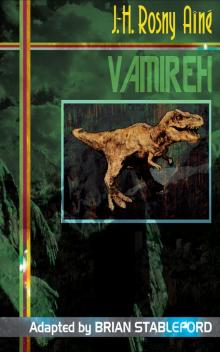 Vamireh
Vamireh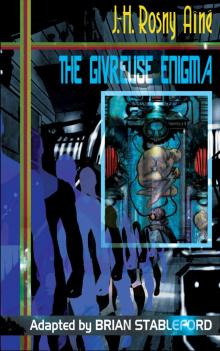 The Givreuse Enigma
The Givreuse Enigma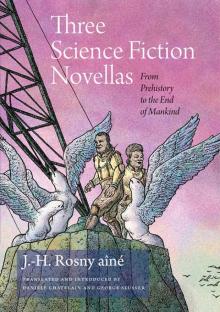 Three Science Fiction Novellas: From Prehistory to the End of Mankind
Three Science Fiction Novellas: From Prehistory to the End of Mankind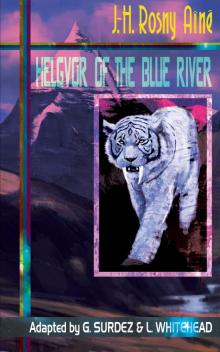 Helgvor of the Blue River
Helgvor of the Blue River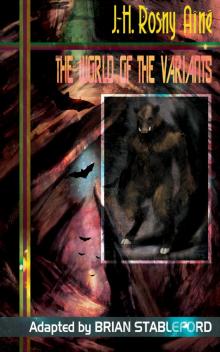 The World of the Variants
The World of the Variants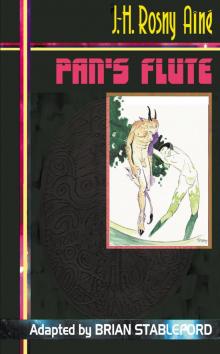 Pan's Flute
Pan's Flute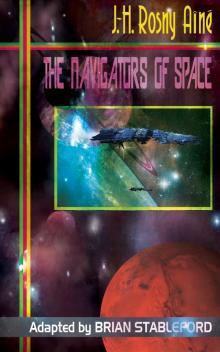 The Navigators of Space
The Navigators of Space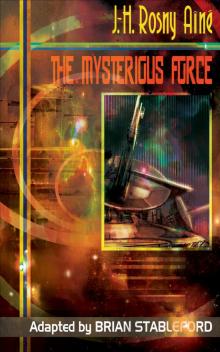 The Mysterious Force
The Mysterious Force